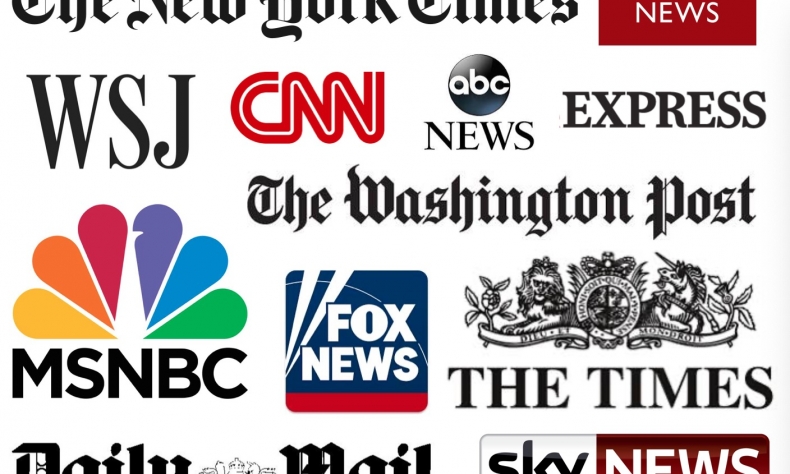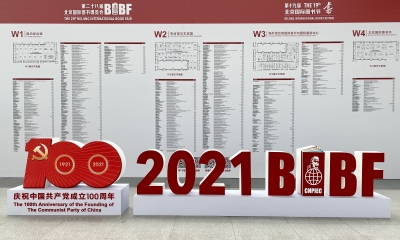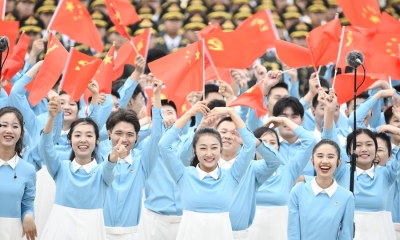A War On Two Fronts: China’s Fight Against Coronavirus and Misinformation

In addition to the rising tide of xenophobia, there is a sea of speculation and misinformation. Many columns in leading publications have sacrificed the most fundamental journalistic principle of reporting the truth in favour of spreading rumour and baseless speculation.
As China continues to fight against the deadly coronavirus, the embattled nation has also found itself forced to battle against anti-China sentiment and economic fear-mongering.
The outbreak of novel coronavirus (COVID-19) appears to have given the green-light to certain mainstream media outlets to indulge in xenophobic and border-line racist attacks.
In Germany, the cover of the latest Der Spiegel issue reads “Coronavirus: Made in China.”
In France, a local newspaper displayed a picture of a woman wearing a mask alongside the caption, “Yellow Alert”.
And in Denmark, the Jutland Post newspaper published a cartoon which replaced the stars on the Chinese national flag with pictograms of the deadly virus.
Perhaps the most repugnant of all is the Wall Street Journal op-ed piece titled, “China Is the Real Sick Man of Asia.”
The article, written by the journals Global View Columnist, Professor Walter Russel Mead, received hundreds of angry comments when the author shared it on his Twitter platform. Commentators described it as “xenophobic”, “insensitive” and outright “racist.”
Catherine Ceniza Choy, a professor of ethnic studies at the University of California, Berkley, condemned the column as “extremely harmful and wrong.”
“The consequences of publishing an opinion piece like this by mainstream media include stoking more fear and anxiety, and increasing hostility against Chinese and other Asians throughout the world.”
In response to the article, China’s Foreign Ministry lodged an official complaint with the US-based newspaper.
Spokesperson Geng Shuang said at the daily briefing online on February 19 “The WSJ article belittled our efforts to fight the epidemic.” Geng added that the headline was “racially discriminatory and sensationalist… with no respect for facts and professional ethics.”
“The Chinese side lodged stern representations with the WSJ repeatedly to make clear our solemn position on this and demand that it recognizes the severity of its mistake, make an official apology publicly and hold the persons involved accountable,” Geng said.
As yet, there has been no response from the Wall Street Journal. The article – along with its racial and grossly insensitive headline – remains online.
Economic fear mongering
In addition to the rising tide of xenophobia, there is a sea of speculation and misinformation. Many columns in leading publications have sacrificed the most fundamental journalistic principle of reporting the truth in favour of spreading rumour and baseless speculation.
Take for example, the article published by Forbes, titled “Four Reasons Why Coronavirus Outbreak Could Lower China’s Growth Down to Five Percent.”
In the 1000-plus-word piece, author Gaurav Sharma, does not reference any financial authority or quote a single economist to back up his claim that China’s growth could fall to “five percent or lower.”
Further, a quick search of the leading financial institutions actually contradicts the fact-light Forbes article.
The International Monetary Fund (IMF) forecasts China’s economy to grow by six percent this year.
Sharma reports, “On February 3, the Shanghai Composite index closed nearly 8 percent lower; its biggest daily drop for more than four years.” He went on to note that such a substantial fall offers “an indication of how the market perceives [China’s] current state of affairs.”
What the author failed to mention is that Chinese stock markets went on to post gains every day between the referenced fall on February 3, to the day his article was posted on February 12.
On the day Sharma’s piece was published, “Chinese stocks stretched their gains to seven days in a row,” reported Reuters. During the week-long rally, the Shanghai Composite recouped the majority of its initial losses and the Shenzhen Stock Exchange climbed to its highest peak in three years.
The chances that Sharma was unaware of both the IMF report and the seven-day market bull-run is extremely remote. The glaring omissions found in his article cannot therefore be chalked-up to incompetence.
Instead, it appears the author went to great lengths to purposely omit the consensus of the international financial community and cherry-pick market data in order to construct a narrative based on fear rather than fact.
Commenting on the rising xenophobia and misinformation in the mainstream media and beyond, Tedros Adhanom Ghebreyesus, the Director-General of the World Health Organization (WHO), said, “This is a time for facts, not fear. This is a time for science, not rumors. This is a time for solidarity, not stigma.”
Coronavirus economic impact
The extent to which China’s economy is impacted by the coronavirus ultimately depends on the time it takes to bring the virus under control and for the country to resume business as usual.
At this stage, it is too early to assess the full economic impact of the epidemic, but the latest reports suggest cause for optimism.
China’s Ministry of Health reports that outside of Hubei, the number of confirmed cases of coronavirus has steadily dropped for 15 consecutive days. The data shows that there were just 56 new cases on February 18, down from 890 on February 3.
Professor Zhang Jun, the director of the China Centre for Economic Studies, believes the coronavirus epidemic is “very unlikely” to last long and that China’s “unparalleled ability to mobilize resources” will ensure the long-term economic impact is minimal.
“According to my preliminary estimates, the worst-case scenario is that the epidemic lowers GDP growth the first quarter by a third or a half,” Zhang said. “If things start to look up in the second quarter, the ensuing rebound will partly offset that drop.”
In any case, the economics professor believes that China’s economic growth will “accelerate again during the second half of the year.”
To mitigate the adverse economic impact of the coronavirus, the Chinese Communist Party has begun implementing a variety of measures including liquidity stimulus, loan support and targeted tax cuts.
IMF Managing Director, Kristalina Georgieva, welcomed the “appropriate measures” China has taken with regards to the economy.
China is “very quickly” taking a combination of measures to boost healthcare and also boost liquidity in the affected areas, Georgieva said.
Gerry Rice, an IMF spokesperson added, “Over the medium to long term, we remain confident that China’s economy is resilient.”
With the number of cases outside the epicenter steadily falling, and leading financial authorities confident in the measures China is taking, the facts suggest that the damage to China’s economy will remain limited to the short-term.
 Facebook
Facebook
 Twitter
Twitter
 Linkedin
Linkedin
 Google +
Google +







